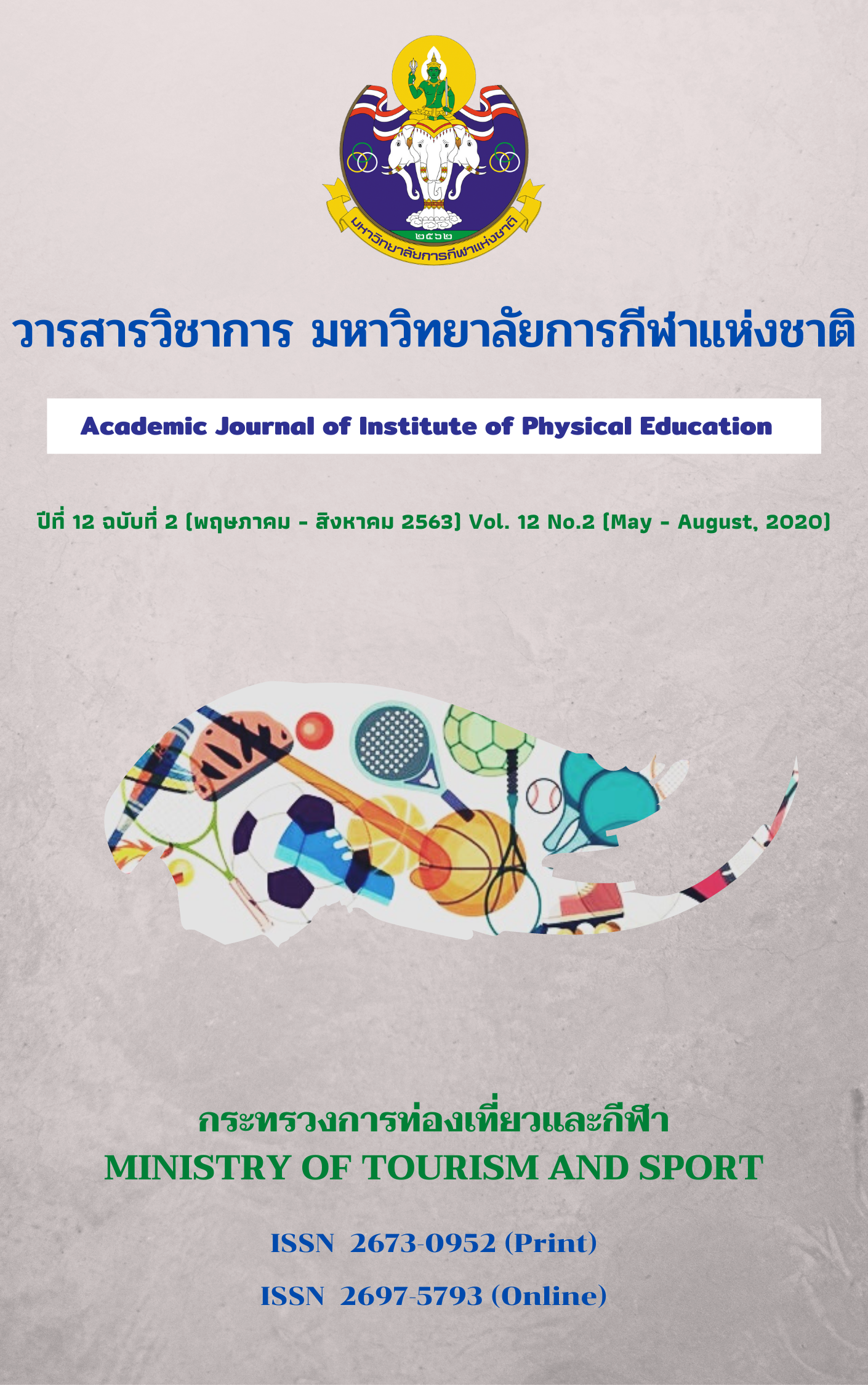BEHAVIORS IN AND BARRIERS TO EXERCISE IN AMMARTPANICHANUKUL SCHOOL STUDENTS IN KRABI PROVINCE
Main Article Content
Abstract
The purpose of this study was to find out the behaviors in and the barriers to exercise in Ammartpanichnukul school students in Krabi Province. The samples of this study were 360 secondary-school-level-1-to-6 students. The samples were selected utilizing Multi-statge random sampling method consisting of stratified and cluster random sampling. The instrument used to collect the data was a questionnaire consisting of checklist, rating scale and open ended questionnaires. The total content validity and reliability of the questionnaire were 0.95 and 0.83 respectively. The statistics for the data analysis were frequency and percentage. Based on the analysis of the gathered data, the two findings were: 1) Most of male students often exercised with their friends on Friday, while female students exercised with their family on Saturday. They usually exercised after school 1–2 days a week at the public parks near their residence for 20–30 minutes. The main purpose of their exercise was health development. They always developed their circulatory and respiratory systems by jogging and walking and improved their body flexibility by stretching exercise. The male and female students enhanced their muscular strength using weight training equipment and body weight respectively. The stretching exercise was utilized in both warm-up and cool-down activities less than 5 minutes for male and 5–10 minutes for female students. 2) Most of students had exercise barriers at a high level, but male students in secondary school level 1 had such barriers at a moderate level. This study was also found that the tiredness of learning activities was the exercise barrier of male students in secondary school level 1 and 3, and the laziness was the barrier of female students in both secondary school levels. In addition, the weariness as mentioned was also the exercise barrier of both secondary school level 2 and 6 students. Apart from that, this study was also found that the time limitation and laziness were the exercise barriers of secondary school level 4 and 5 students respectively.
Article Details
The published article is a copyright of the Academic Journal of Thailand National Sports University. The passage appeared in each article in this academic journal is a perspective of each author which is not related to the journal. Each author is required to be responsible for all components of his/her own article. If there are any mistakes, each author must be responsible for those mistakes on his/her own.
References
Authaporn Chutuam. (2018). Exercise behaviors and barriers of secondary school level 1-3 students of Princess Chulabhorn Science High School. (Master’s Thesis). Kasetsart University, Faculty of Education.
Boonchom Srisa-ard. (2002). Introduction to Research. (7thed.). Bangkok: Suriwiriyasain.
Chanlak Yiammirt. (2013). A study of exercise behaviors of Rajabhat Rambhai Barni University. (Master’s Thesis). Srinakharinwirot University, Graduate School.
Channarong Fukkhoksung. (2017). Exercise for Health. Retrieved December 29, 2017, from http://program.npru.ac.th/pe/Exercise%20for%20Health(AT).html.
Kasem Chuapanang. (2008). Exercise for Life. (2nded.). Bangkok: Rajabhat Pranakon University.
Ministry of Education. (2009). Foundation course, basic education, 2008. Bangkok: Printing Agriculture Cooperatives of Thailand.
Wanthana Yimaiem. (2018). Behaviors and barriers in exercise of Kasetsard University Bangken Campus Students. (Master’s Thesis). Kasetsart University.
Waree Sayanha. (2003). Behaviors health promotion in exercise of middle-age people of Bankha Subdistrict, Ratchaburi Province. (Master’s Thesis). Silapakon University.
Wiwat Kanchana. (2008). Exercise behaviors of Krabi Province Adult Education Center. (Master’s Thesis). Srinakarinwirot University.
Suchat Sitthiwong. (2018). Exercise behaviors and barriers of undergraduate student in Suratthani Rajabhat University. (Master’s Thesis). Institute of Physical Education Krabi Campus.


